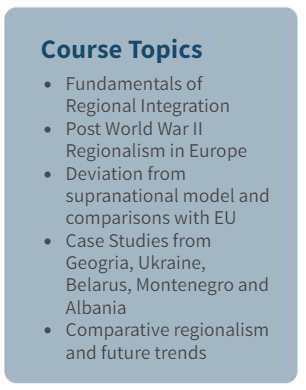Regionalism in Europe
Course Summary:
‘Common Challenge of Competing Regionalisms’ is an online course on regionalism in Europe and Eurasia offering a comprehensive understanding of comparative regionalism against the backdrop of broader themes such as supranationalism and democracy. It utilizes e-learning formats such as knowledge clips, academic commentaries, and guest interviews. The international student cohort from 77 countries enrich discussions on the topic. The course promotes active engagement through student-centered tasks facilitated by interactive online exercises like flashcards and forums. All written assignments have detailed assessment criteria and grading rubrics, along with provision of individual feedback. Pre-course and post-course surveys allow students to give feedback and contribute to course improvement.
Course Design:
- International and Interdisciplinary Perspectives:

This course embodies the ongoing discourse and debate on the nature of regional integration and cooperation in Europe. The contributions of video lectures from a diverse team of instructors (EU and other countries such as Albania, Montenegro, Finland, Ukraine and Georgia) are designed to reflect nuances of the topic and encourage critical discussions while addressing varied viewpoints. The course attracts an international student cohort from 77 countries, further enriching their exchange on the topic.
- Active Teaching Methodologies:
The online course is taught using diverse e-learning formats:
- Knowledge clips: Short 10-15 minute videos presenting basic definitions and concepts related to comparative regionalism, integration processes in Europe and Eurasia, and references for further exploration (weeks 1-2).
- Academic commentary/round-table discussions: Video lectures featuring academic experts, providing an in-depth and critical analysis of the integration process and comparing the EU and EEU in terms of regional integration (weeks 3-4 and 6).
- Guest interviews: Video interviews with academic representatives from Georgia, Ukraine, Belarus, Montenegro, and Albania, offering specific perspectives on competing regional integration projects (week 5). Each interview lasts 20-40 minutes
Additionally, student-centred tasks promote their independent and active engagement with the course material. Tools such as flashcards emphasize self-improvement, while forum discussions, Padlet-community boards, and peer-learning facilitate student interaction and critical perspectives on comparative regionalism. Students ask questions, share reflections, and comment on each other's contributions.
- Formative Assessments and Feedback:
All written assignments in the course have detailed assessment criteria and uses a grading rubric on Moodle. This ensures transparency and clarity in evaluating students' performance. By providing specific criteria, learners know what is expected of them and how they will be graded. The online consultations with students via Zoom before the first written assignments are submitted, allow learners to seek necessary guidance and clarify any doubts on the assessment criteria.
In addition to the assessment rubrics, lecturers also provide individual feedback to each student on their written submissions. This personal feedback allows students to understand their strengths and areas for improvement.
Students are also given the opportunity to provide feedback twice – before the course and after completing it. This allows the course team to gauge learners' expectations before the course and their overall experience after course completion.
In the following video, you can watch designers of the course explain their motivations, processes and experiences of implementing the course.
Contact:
Anna Beitane
